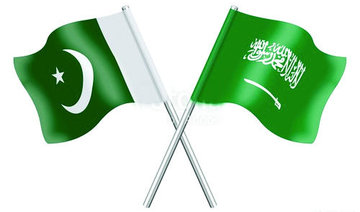ISLAMABAD, July 15: A leading contender to be Pakistan’s next prime minister has pledged to boost ties with Saudi Arabia if his party wins this month’s general election.
In an exclusive interview with Arab News, Pakistan Tehreek-e-Insaf (PTI) chairman Imran Khan said his country enjoyed a “very special relationship with Saudi Arabia” and he planned to nurture it further.
He said it was important for Pakistan to have good relations with other countries, and its ties with Saudi Arabia were unique since the Kingdom had “always been a friend to Pakistan in its difficult times.”
Discussing the ongoing political turmoil in the Middle East, Khan said: “Pakistan should play the role of a healer and bring people together. What it should not do, however, is be partisan because we have already suffered by joining a conflict that was led by the United States … So we need peace and the best thing for us would be to play a role of conciliation among Muslim countries.”
Khan said he believed the military was the only state institution that is properly functioning in Pakistan.
“All the other state institutions have been devastated by corruption, cronyism and destruction of merit,” he said. “That explains why other institutions are lagging behind. What we need is to raise all institutions up and then make them work together.”
Khan was about to sit in his helicopter to visit Mardan and Swabi when Arab News caught up with him for an interview. The PTI leader exuded confidence as he prepared to meet the public — although according to Pakistan’s top counterterrorism authority, his name features high on a hit list prepared by various militant factions operating in this volatile region.
The PTI leader said he was more confident than ever that his party was in a position to win the election on July 25. “This is the best campaign we have run,” he said. “I think we are the party that is prepared for it and I feel this is our time.”
Khan has woven his election narrative around the twin problems of corruption and selective implementation of the law. After struggling for 22 years, his moment arrived last July when the Supreme Court of Pakistan first barred the three-time prime minister, Nawaz Sharif, from holding public office, before an anti-graft tribunal recently convicted him of owning assets beyond his stated means of income.
Sharif was in London to meet his wife, who suffered a heart attack last month, when the accountability court announced the verdict against him. There was some speculation that he might not return to the country. However, he flew back to Pakistan last Friday with his co-convicted daughter, Maryam, to face the justice system and was immediately thrown behind bars.
“This is the first time a powerful crook has been brought through a court of law and put into prison,” Khan said. “It is a big achievement for Pakistan.”
However, it was still not enough, he said. “Sharif is not the only one. Asif Zardari [of the Pakistan Peoples Party] is the other leader in this country who has accumulated billions of dollars of wealth outside Pakistan … These are the two symbols of corruption.”
Khan said the two politicians had not only “damaged the country by siphoning off money which should go to the people” but also “put pressure on the rupee” by keeping their wealth abroad. “The rupee falls, the dollar rises because of money-laundering, and it is a double blow to the country.”
The PTI leader said that Pakistan was awaiting across-the-board accountability. “Justice is blind,” he said. “It does not care whether someone belongs to PTI, Peoples Party or PML-N (Pakistan Muslim League-Nawaz). Anyone who steals should be put behind bars.
“The problem with Pakistan is that we have not followed this principle. We have one law for the powerful and one for the weak … Only the weak go to jail, the powerful go to the assemblies … That is why this country is suffering.”
Khan did not deny that he might have disbursed party tickets among some individuals who reek of corruption. “We do not have any intelligence agency to test if someone is corrupt or not,” he said. “If the law allows, we give them tickets to contest elections. But what we will do when we acquire power is to initiate a robust accountability process. No one will be spared.”
Asked about his top priorities if he managed to form the next government, he said that he would strengthen the National Accountability Bureau (NAB) and fix the Federal Board of Revenue (FBR). The former, he noted, would clamp down on corruption, while the latter, mandated to collect taxes, would make it easier “to pay for our expenditures and have enough money to spend on our human beings.”
Khan once ran a potent campaign against US drone strikes in Pakistan’s troubled northwestern territories and even instructed his party workers in the Khyber Pakhtunkhwa province to block NATO supply lines to Afghanistan. However, he said his administration would like to have “mutually beneficial” relations with Washington, though he also expressed his discontent with American governments for using Pakistan “liked a hired gun.”
“Fighting their wars has proved very costly for Pakistan. What we would like to have is a mutually beneficial relationship with the US and with all the neighbors,” he said.























